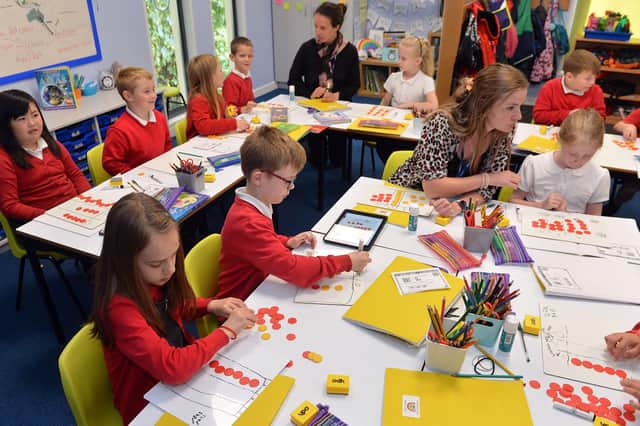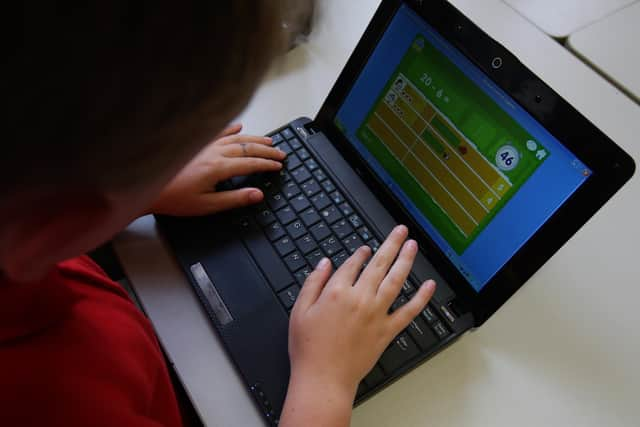How Budget betrayed schools and numeracy learning – Ben Caulfield


Children were tested on their knowledge of maths. If enough children scored enough points from answering questions and learning, they helped their school by winning a prize for the maths department.
One of the winners was St Wilfrid’s Catholic High School in Featherstone. The amazing thing was, nobody even knew the children had entered the league.
Advertisement
Hide AdAdvertisement
Hide Ad

It showed how, left to their own devices, children were happy to show off their maths skills without having to be instructed by an adult. There’s a lesson here for Yorkshire schools – education is going to need the ingenuity and passion of our children, because last week’s Budget proved the Government isn’t going to put a great deal more funding into schools.
In this Budget, one statistic stands out: healthcare is taking an ever-larger share of the public finances. The health and social care budget rose from about a third of government spending in 2009-10 to nearly half by 2015-16. Of the £111bn in additional government spending announced since 2010, £84bn has been eaten up by health and social care.
For parents and children in Yorkshire, the Budget was a missed opportunity to address the scarring effect of the pandemic, in terms of education lost, and also mental health and family circumstances.
Advertisement
Hide AdAdvertisement
Hide AdSchools can easily be seen as a soft option rather than an economic necessity. But if you look at the rhetoric around levelling up for the North, you need to invest in the workforce of the future.


After that Budget, we now have to ask how we are going to deliver the kind of education our children deserve. The Government wants a high-skilled labour force, but fails to provide the money to create it. The good thing is our children are showing us the answer: technology.
Children never cease to amaze us with their ingenuity. They show us over and over again how technology can be used to make education suit them. The most important factor in every child’s education is their teacher. This was further underlined during the pandemic when it became clear that those children who were less motivated fell behind the most. Our own research demonstrates that there are strong relationships between confidence, motivation and learning outcomes. The role of the teacher isn’t only to explain things, it’s to help children to stick with it, even when they’re having a bad day.
For five years, heads in Yorkshire have warned of a teacher shortage. The data suggest this region suffers disproportionately from staff sickness and other issues, which exacerbate the problem. Yet, far from throwing money at the problem, the Budget brought us only back to 2010 levels of funding. It has become clear over successive funding settlements that the answer isn’t more teachers, but using technology that enhances each teacher’s ability to help children fulfil their potential.
Advertisement
Hide AdAdvertisement
Hide AdIn the past decade, a range of technologies have reached a level where they are cheap and easy enough to use that they can really enhance the work of teachers. Technology can help teachers organise the classroom, to sit children in groups that maintain behaviour or help with peer-to-peer learning. Teachers have proven to be highly adaptable during the pandemic, with research showing education technology became a lifeline. For teachers and parents, resources are available, such as the website Ed Tech Impact, which can help them work out which technologies are the most likely to solve the particular issue they face.
Yet barriers remain. The pandemic revealed an uneven distribution of devices in the hands of home-learners. The Government has fallen short here. The campaign group Digital Access for All estimates that at least a million children are living in a home with no access to a tablet, desktop or laptop computer. This is a startling fact for a relatively rich country in 2021.
It also masks deep inequality. The poorest households are the most likely to have no access to educational technology. The North Yorkshire Rural Commission’s recent report revealed a fifth of rural areas in the county have no broadband. These issues need to be addressed if technology is to be the answer to the education funding challenge, to make up for the Government’s clear signal that their priorities lie elsewhere.
Ben Caulfield is the founder of Eedi, a maths tool used by 18,000 schools, which is free for schools and families.
Advertisement
Hide AdAdvertisement
Hide AdSupport The Yorkshire Post and become a subscriber today. Your subscription will help us to continue to bring quality news to the people of Yorkshire. In return, you’ll see fewer ads on site, get free access to our app, receive exclusive members-only offers and access to all premium content and columns. Click here to subscribe.
Comment Guidelines
National World encourages reader discussion on our stories. User feedback, insights and back-and-forth exchanges add a rich layer of context to reporting. Please review our Community Guidelines before commenting.